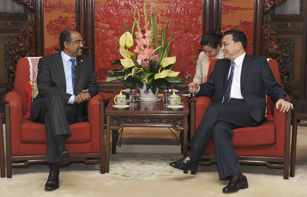
Feature Story
UNAIDS Executive Director commends Chinese government for its bold leadership on AIDS
26 June 2012
26 June 2012 26 June 2012
UNAIDS Executive Director Michel Sidibé (left) and Chinese Vice-Premier Li Keqiang. Beijing, China. 26 June 2012.
Credit: UNAIDS
UNAIDS Executive Director Michel Sidibé met with Chinese Vice-Premier Li Keqiang in Beijing as part of a two-day official visit to the country. Mr Sidibé acknowledged the significant progress achieved by the Chinese government since his last visit in December 2011 and highlighted the importance of sustained commitment to the AIDS response during, and following China’s upcoming leadership transition.
During his visit, Mr Sidibé also met with Chinese Minister of Health, Dr Chen Zhu, and presented a UNAIDS “Leaders and Innovators Award” to the President of Xinhua News Agency, Mr Li Congjun, at a ceremony in China’s Great Hall of the People.
Speaking to Vice-Premier Li, Mr Sidibé commended the Chinese government for its bold leadership over the past decade, which has led to major investments in China’s AIDS response and a dramatic scale-up of HIV prevention, treatment and care programmes in China. As Chair of China’s State Council AIDS Working Committee, Vice-Premier Li has been instrumental in providing strong leadership in China’s AIDS response in recent years.
According to Mr Sidibé, sustaining political commitment will be critical as China prepares to undergo a leadership transition in late 2012. “There is a sea-change in the AIDS response in China. This is being driven by personal leadership,” said Mr Sidibé.
China has also launched a new Five Year Action Plan on AIDS Prevention and Control, setting out ambitious targets, and has committed to fully funding its AIDS response following the withdrawal of major international donors. Uptake of voluntary HIV testing and counselling has increased rapidly. Last year, more than 80 million people received an HIV test in China, and more than 130 000 are now receiving lifesaving antiretroviral treatment, free of charge.
I am calling on Africa and China to explore a new paradigm for sustaining the AIDS response through increased shared responsibility and by looking at transfer of technology and knowledge and building capacity for life-saving medicine
UNAIDS Executive Director Michel Sidibé
Mr Sidibé stressed the importance of improving coverage of services amongst key affected populations such as men who have sex with men, sex workers and people who inject drugs. He congratulated China on its progress made scaling up access to antiretroviral medicines, and encouraged further efforts in this area. “China is leading the way on Treatment as Prevention,” said Mr Sidibé. “Continuing to explore effective approaches and models in this area will be essential for success.”
Vice-Premier Li reiterated China’s continued commitment to HIV prevention and said China stands ready for closer cooperation with UNAIDS. He said that China will deliver on its 2015 AIDS promises and that it will do whatever it can to provide medical support and medicines for AIDS.
Following China’s successful hosting of the 3rd China-Africa Roundtable on Health earlier this month, Mr Sidibé encouraged China to continue to expand its role in facilitating south-south cooperation, particularly inAfrica. “I am calling on Africa and China to explore a new paradigm for sustaining the AIDS response through increased shared responsibility and by looking at transfer of technology and knowledge and building capacity for life-saving medicine,” said Mr Sidibé. He reiterated UNAIDS’ continuing support for China’s efforts to expand its role in international cooperation and emphasised the role China can play in supporting production of ARV drugs in Africa, reducing the continent’s reliance on imports.



